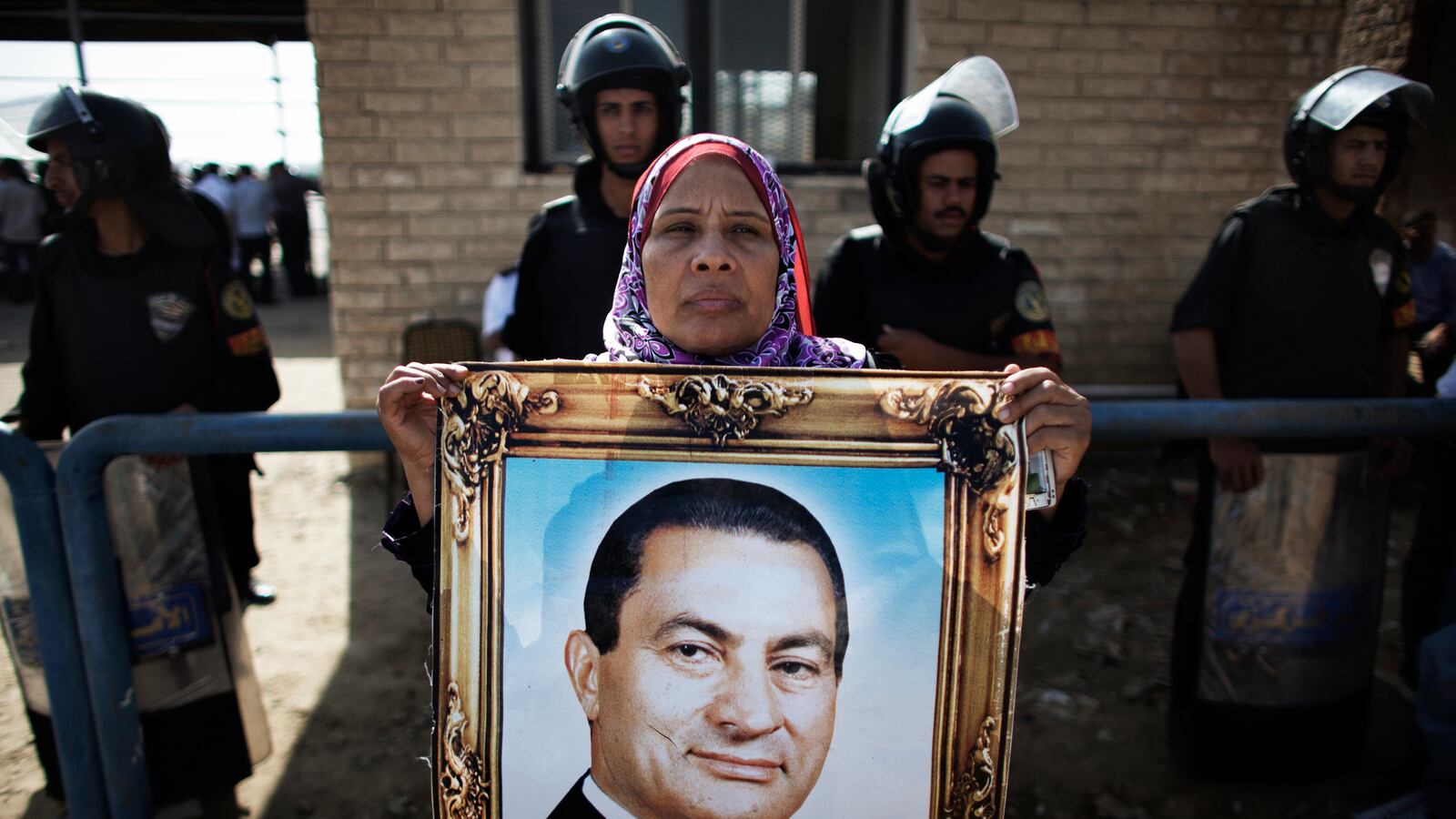In August 2011, Hosni Mubarak, deposed just six months earlier by the Egyptian revolution, traveled by helicopter to a Cairo courthouse to stand trial. Crowds massed outside the building to behold the spectacle, while tens of millions of people tuned in on TV as the former dictator, ailing on a rolling hospital bed, made his jarring appearance inside the court’s metal defendant’s cage. Facing charges over the deaths of hundreds of protesters during his last days in power, Mubarak was eventually convicted of being an accessory to murder and handed a life term in jail.

Since then, the man who dominated Egyptian life for three decades has faded from the spotlight. Egypt’s first democratically elected president, Mohamed Morsi, took office in June, narrowly beating out Mubarak’s last prime minister. Now the country’s contentious politics center on its controversial new powers, as activists direct their revolutionary chants at Morsi and the Muslim Brotherhood, the Islamist group that backs him.
On Saturday, though, Mubarak will step back into the spotlight. In January, citing the myriad shortcomings of the original trial, an Egyptian court threw out Mubarak’s conviction and ordered a fresh start. Mubarak is set to appear in the same Cairo courthouse, alongside a handful of former officials and his two sons, and his trial will begin again.
With Egypt in the throes of continued crisis—as protests against Morsi have raged, and the economy has plummeted—Mubarak’s retrial has seemed almost an afterthought. But for many Egyptians, who hope that the new trial will bring more answers than the last, and possibly even some measure of closure, Mubarak’s fate remains as important as ever. “There is this sense that events have overtaken Egypt, and that this trial is not front-page news any longer. But the repercussions that may come about from it are enormous,” says Maha Azzam, an associate fellow at Chatham House in London. “And in some ways it’s unfinished business.”
Many activists and human-rights advocates met the news of the retrial with cautious optimism. The initial verdict had sparked widespread protest from Egyptians who wanted the court to go further—both against Mubarak and his despised former Interior minister, who received the same sentence, and against the former security officials who were acquitted.
Held under the council of military generals who ruled after Mubarak—and who had once been a key part of his regime—the original trial saw little hard evidence of who was responsible for the crackdowns during the revolution that caused more than 800 civilian deaths. Mubarak’s own role remained unresolved—a point hammered home by the verdict, in which the presiding judge ruled that even though he had no evidence that Mubarak issued orders for the crackdowns, he was guilty of doing nothing to stop them. As Michael Wahid Hanna, a senior fellow at the Century Foundation in New York, told The Daily Beast after news of the retrial came: “We still don’t really know what happened.”
Tantalizing new information has emerged in recent months. Shortly after taking office, Morsi ordered a fact-finding commission to investigate the deaths of protesters during the revolution, and the few details that have emerged paint a picture of Mubarak as fully aware of the bloodshed and also engaged. “Mubarak knew of everything, big and small,” his old Interior minister Habib el-Adly told investigators from the commission, according to a former member interviewed by The New York Times. Mubarak even watched the events live on an encrypted video feed, reported the Times, which added that Adly claimed Mubarak had “authorized the use of any means to stop the demonstrations.”
Adly will stand trial with Mubarak on Saturday, along with six former security officials. Adding to the drama, Mubarak will also face charges of corruption, along with his sons Alaa and Gamal, who are lightning-rod figures in Egypt.
But Azzam, of Chatham House, says any optimism over the new trial is tempered by concerns that it could also open the door to a darker possibility. “The fear is that he may be acquitted,” she says, which would plunge the country deeper into chaos. Even if Mubarak remains behind bars, Azzam adds, the acquittal of his sons would still rile many Egyptians and raise fears of a counterrevolutionary push by remnants of the old regime.
Eric Trager, a fellow at the Washington Institute for Near East Policy, cautions that no matter what outcome the new trial brings, closure may be hard to come by amid Egypt’s continued upheaval. “The story of the revolution is still being written, with or without Mubarak,” he says.






